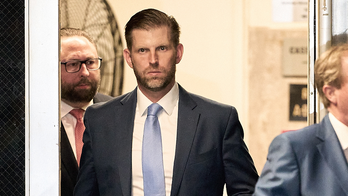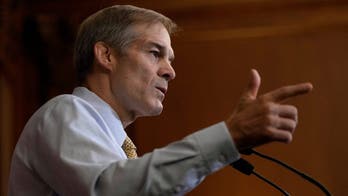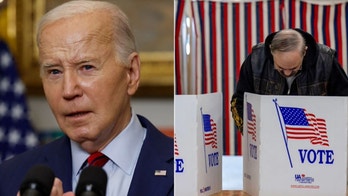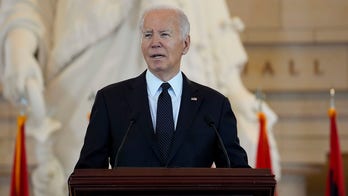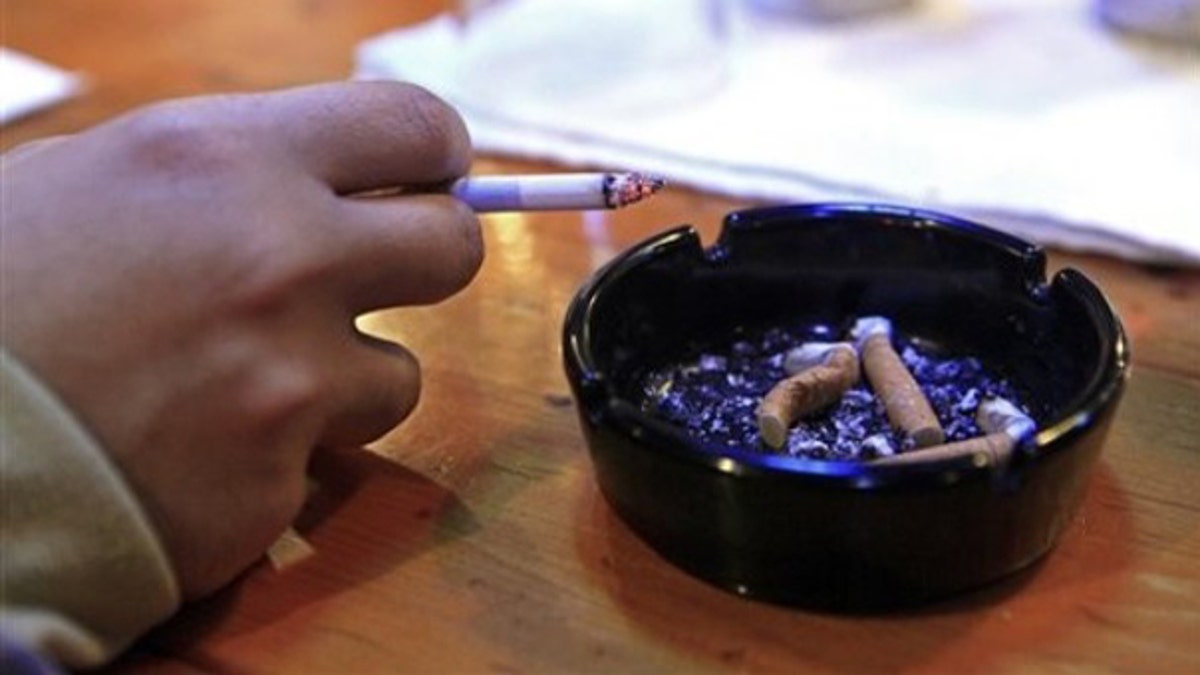
FILE: 2009: A smoker at the Satisfaction Restaurant & Bar in Durham, N.C. (AP)
Just a year after smokers were slapped with the single largest federal tobacco tax increase ever, public health advocates are urging states to follow up with their own cigarette tax hikes to offset declining revenues lost in the recession and to press more people into giving up smoking.
A new report by a coalition of public health organizations says states could raise more than $9 billion in new annual revenue by increasing cigarette taxes by $1 per pack.
The report, "Tobacco Taxes: A Win-Win-Win for Cash-Strapped States," argues that the taxes also would cause more than 1.2 million adult smokers to quit, prevent more than 2.3 million kids from becoming smokers and save $52.8 billion in health care costs.
But critics say a cigarette tax increase would be "foolish" and that the taxes are now "way too high" and target the poor.
"When you raise it a buck, you're taking it out of the hands of people with not much disposable income, and $1 buck a day is significant income," said William Ahern, the director of policy and communications for the Tax Foundation.
He added that since smokers can avoid tax by buying cigarettes on the black market, the increase is "criminalizing the population."
"Cigarettes are being sold on street corners like illegal drugs," he said. "There's a lot of crime associated with this now."
Tobacco taxes soared last year to finance a major expansion of health insurance for children. The federal government raised the per-pack tax to $1.01 from 39 cents, causing the major cigarette makers to raise their prices, partly to offset any drop in profits.
Fifteen states also increased taxes on cigarettes last year, according to the Centers for Disease Control and Prevention, including Florida (33.9 cents to $1.33), Connecticut ($2 to $3), Arkansas (59 cents to $1.15) and Rhode Island ($2.46 to $3.46), making it the highest in the country.
Now public health advocates are pushing states to take similar steps to help tackle unprecedented budget shortfalls and reduce smoking.
"When it comes to saving lives and injecting new revenue in depleted state coffers, we should not hesitate to support measures that will accomplish both," said Nancy Brown, CEO of the American Heart Association, one of the groups behind the report.
"Raising tobacco taxes will protect children and adults from tobacco use, reduce health care costs and revitalize critical health and education programs that too often fall victim to state budget cuts," she said.
Among the other groups behind the report are the Campaign for Tobacco-Free Kids, American Cancer Society Cancer Action Network and the American Lung Association.
Smokers have already seen state taxes on cigarettes skyrocket in the last decade. Rhode Island's tax rate was 71 cents in 2000, bringing in $58.5 million, according to the annual Tax Burden on Tobacco data.
The number of smokers in Rhode Island declined from 22.7 percent in 1998 to 17 percent in 2007, when it raised $117.3 million. Revenues fell to $112 million in 2008. But this fiscal year, the state is estimated to bring in $139.2 million.
New York is poised to overtake Rhode Island with a $1 hike in Gov. David Paterson's budget proposal that would bring the rate to $3.75. In 2000, the cigarette tax rate was 56 cents, leading to $732.7 million. The number of smokers has declined there from 24.3 percent to 18.9 percent in 2007, when it pulled in $934.6 million. This fiscal year, the state is expected to bring in $2.13 billion.
The lowest rate is South Carolina's 7 cents per pack, and revenues there have remained pretty consistent, from $26.7 million in 2000 to $26.5 million in 2008.
But Ahern said the number of smokers is not declining as much as suspected, because the smoking rate is based on the taxes paid in sales and fails to account for Internet shopping and black market sales.
He also argued that the taxes are unfair to low-income individuals, who he says make up the majority of smokers.
"Some smokers are paying 5 to 10 percent of adjusted gross income in taxes," Ahern said. "How would we feel if one of our vices cost us 5 to 10 percent our adjusted gross income?"
Ahern said that his group is not in favor of cigarettes but is interested in how anything is taxed.
"Those taxes can get so high, a lot of unintended consequences occur and can be worse than smoking," he said.

